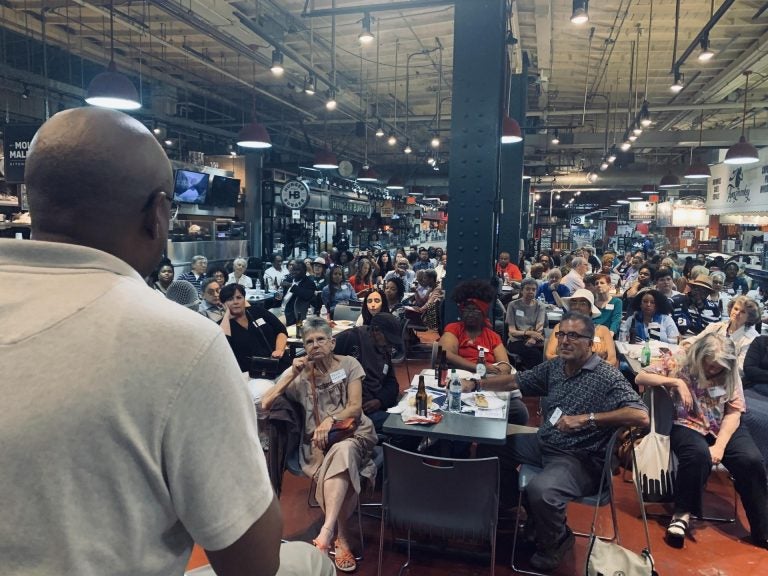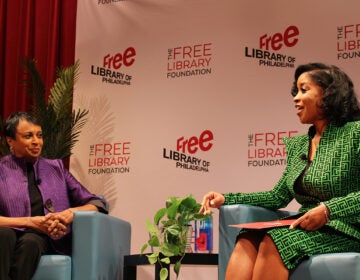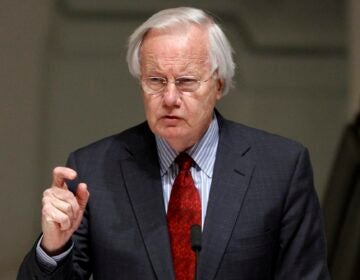Seeing each other’s humanity – through the lens of a glass
Professor David W. Brown argues that the best way to overcome the nation’s racial divide is if people with polar opposite views find a way to talk to each other.

The Beer Summit on Race is an annual conversation held at the Reading Terminal Market on race and racism. (Courtesy of Global Citizen)
I — like many of you — am struggling to make sense of the madness we’ve been experiencing lately.
Back-to-back mass shootings…rhetoric that inflames mob mentality…a feeling that anything bad can happen anywhere, at any time.
And yet, signs remain that fill me with hope.
Recently, nearly 200 people from around Philadelphia gathered for an annual tradition — something that seems rarer these days.
These folks – who are more strangers than friends – sat down on a warm summer night over a cold beer to talk about a topic too many of us would rather avoid: racism.
It was the Annual Beer Summit on Race, which was held at the Reading Terminal Market and organized by the nonprofit Global Citizen, which runs the annual MLK Day of Service: the largest single day of service in the country.
As timing would have it, the summit was held before the tragic events of recent days. Regardless of when it occurs, this Philly tradition provides a sense of sanity and healing that few other events can match.
This year, the summit fell on the 10th anniversary of the 2009 incident in which Harvard Professor Henry Louis Gates – who is black – was mistakenly arrested on his front porch by Cambridge Police Sergeant James Crowley – who is white – for breaking into his own house.
The incident attracted the attention of the Oval Office when then-President Barack Obama invited Gates and Crowley to join him and then-Vice President Joe Biden for a conversation about race over cold brews at the White House.
At the same time in 2009 in Philadelphia, Global Citizen organized their own first annual Beer Summit for concerned citizens to discuss race relations. I was honored to facilitate that first discussion and I’ve been a part of every conversation each year since.
The event has grown from just a handful of eager participants in our early years to a standing-room-only crowd filling the center square of Reading Terminal Market. But along with its growth in size, it seems the problems that prompted the summit have also grown in magnitude. Gates could have easily been the victim of a police shooting instead of an arrest by Crowley as “death-by-police” has reached epidemic proportions for black men in our country.
Tweets, trolls and unchecked vitriol have fueled the fire of hate and emboldened racial animus to a fever pitch. And, presidential leadership that is supposed to be a voice of reason has become a cheerleader for chaos.
Gatherings like the Beer Summit are more important than ever. If for no other time, we get the opportunity to voice our frustrations, share our pain and, most importantly, talk through solutions. We need solutions that will bring all of us — of every stripe and flavor — together to build bridges of understanding instead of walls of ignorance and isolation.
The challenge, however, for events like the Beer Summit, is that it routinely attracts like-minded people who are already dedicated to the work of peace in our communities.
What’s always missing from the table are those who might be viewed as being from the “other side”…those whose ideology may be different from those who gather for this annual ritual of peace. As long as this voice is absent from the table, we will only have half of what is needed to build relationships that can last well after the foam fades from the last poured glass.
One of the most memorable conversations that I’ve ever had was with a self-described white supremacist who had turned away from his violently racist ideology and actively sought me out as part of his own journey to heal from a broken past. To say I was hesitant to meet would be an understatement. But he helped me understand that if no one wants to step across the divide, then the chasm that separates us as human beings only continues to widen.
The reality is that, if we’re committed to the work, we can find more things in common than what separates us. The trick is taking the time to find common ground in order to find a firmer footing.
We won’t hear each other if the only dialogue we exchange is shouting and name-calling. It’s not the beer or the beverage that is key to the conversation — though, in some cases, it helps. It’s the invitation one extends to another that makes all the difference.
Dr. Martin Luther King, Jr. once famously said, “Darkness cannot drive out darkness; only light can do that. Hate cannot drive out hate; only love can do that.”
Let’s lift a glass to finding the light in these dark times together.
—
Rev. David W. Brown is the Diversity Advisor to the Office of the Dean at the Klein College of Media and Communication at Temple University, where he also serves as an assistant professor.
WHYY is your source for fact-based, in-depth journalism and information. As a nonprofit organization, we rely on financial support from readers like you. Please give today.




